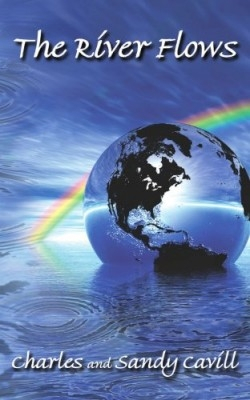The River Flows
Like all literature The River Flows must be filtered by the life experience beliefs and spiritual maturity each reader brings to it. For the book’s intended audience (open-minded American Christians or those willing to let God change their hearts) the “river” can be seen as the waters of Psalm 46 (4-5) and a metaphor for the Holy Spirit. Faith-based Christians will appreciate the rich sprinkling of Bible verses throughout the text which back up the Cavills’ ideas: For example “God is a Spirit Who will fill us to overflowing if we ask” (Luke 24:49) “God is the satisfaction for all people” (Acts 17) and “God is Light” (1 John 1:5).
But conservatives prepare to be shocked. The Cavills’ passage on “Hell” or “darkness” seems more in line with Pope John Paul II’s interpretation as foolish human choices resulting in the “pain frustration and emptiness of life without God” rather than the fundamentalists’ fiery pit plagued by pitchfork-wielding devils. Even more astonishing the authors claim that much of this “darkness of manmade religions” can be found inside our nation’s churches which focus on “greed prosperity and coveting riches.” The Cavills’ injunction to cease fostering the Satan-inspired rifts in our nation’s political system will surely be resisted by many fanatics on the right and the left including some so-called Christians in positions of wealth and power.
Another of the book’s more controversial ideas is that God did not cease to communicate with the human race when the ink dried millennia ago on the last scrolls of the books we now call the (Protestant) Bible. Diverse authors like Joseph Smith Neale Donald Walsch and William Sears have previously made this point but unlike the Conversations With God books or the Baha’i religion which tolerates different faiths as “windows in the same church” the Cavills strive to convert their Japanese students from Shintoism to Christianity.
Whether the reader views this as culturally arrogant imperialism or a Divine moral imperative will depend on the reader’s core beliefs.
The quality of the writing here is average to above the proofreading slightly less than professional—the author bios say that Charles “is” a career and there are some subject-verb agreement problems in the text—but the pacing is good with that of the second half surpassing the first by including more personal examples of what the authors view as God at work: Particularly convincing are references to a Tokyo earthquake the terrible tsunami of Christmas 2004 and Hurricane Katrina.
This book has the potential to be either radically life-changing or simply something to think about for a time depending on the diversity and depth of religious ideas to which readers have previously been exposed. If one believes in God and is able to bring the innertube of an open mind along then this river will be a worthwhile float.
Author Credentials: Charles and Sandy Cavill work in Tokyo Japan as a hotel manager and an English teacher respectively. Mrs. Cavill has a ministry to Japanese students.
Disclosure: This article is not an endorsement, but a review. The publisher of this book provided free copies of the book and paid a small fee to have their book reviewed by a professional reviewer. Foreword Reviews and Clarion Reviews make no guarantee that the publisher will receive a positive review. Foreword Magazine, Inc. is disclosing this in accordance with the Federal Trade Commission’s 16 CFR, Part 255.

